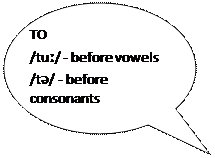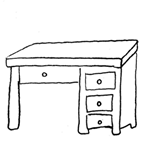Lesson Three
· Consonants: /m/, /n/ /ŋ/, /ð/, /θ/
· Vowels: /e/, /æ/
· Pronunciation of particle ‘to’
· Assimilation
· Regressive Assimilation
· English Rhythm
/e/ – vowel, non-labialized, forelingual, short, monophthong
/æ/ – vowel, non-labialized, forelingual, monophthong
 При произнесении гласного /e/ язык находится в передней части полости рта, средняя часть языка поднята к твердому небу, губы слегка растянуты. По сравнению с русским /э/ английский /e/ более закрытый.
При произнесении гласного /e/ язык находится в передней части полости рта, средняя часть языка поднята к твердому небу, губы слегка растянуты. По сравнению с русским /э/ английский /e/ более закрытый.
При произнесении /æ/ рот широко раскрыт, язык находится в передней части полости рта, плоско лежит во рту, средняя его часть несколько приподнята. Углы губ слегка оттянуты в стороны. Русский гласный /э/ менее открытый, чем английский гласный /æ/. Чтобы избежать ошибки типа русского /э/ следует шире открывать рот.
Ex.3.1. Read the words.
| /pen/ | /ten/ | /fred/ | /best/ | /lesn/ |
| /ben/ | /bel/ | /ˈklevǝ/ | /ˈbetǝ/ | /nekst/ |
Ex.3.2. Listen and read.
Listen and read.
| /e/ | e | check | leg | letter | red | sentence |
| ea | bread | head | read (past) | |||
| ie | friend | |||||
| a | any | many | ||||
| ai | again | said |
Ex.3.3.  Listen and repeat.
Listen and repeat.
1. Tell me again. 4. Twenty to twelve.
2. Send me a cheque. 5. Help your friend.
3. Correct these sentences.
Ex.3.4. Listen and read.
Listen and read.
/ten/ /get/ /en/ /det/-/ded/ /sɪt/-/set/ /ˈbɪzi/-/ˈbeni/ /gets/
/pen/ /pet/ /eg/ /bet/-/bed/ /bɪt/-/bet/ /ˈpɪti/-/ˈbeti/ /pets/
/men/ /net/ /et/ /set/-/sed/ /bɪg/-/beg/ /ˈmɪni/-/ˈmeni/ /bedz/
/dɪd/-/ded/ /kɪdz/
Ex.3.5. Read the words.
| /pæn/ | /æks/ | /ˈhæpi/ | /hæt/ | /ˈpætrɪk/ |
| /mæn/ | /æn/ | /bæg/ | /kæt/ | /ˈkæri/ |
Ex.3.6. Listen and read.
Listen and read.
| /æ/ | a | back | camera | factory | hat | jam | manager | map | plan | traffic |
Ex.3.7.  Listen and repeat.
Listen and repeat.
1. Thanks for the cash. 4. That man works in a jam factory.
2. I ran to the bank. 5. Let me carry your bags.
3. Where’s my black jacket?
Ex.3.8.  Write the words. Then listen and repeat.
Write the words. Then listen and repeat.
Example: /mæp/ __map___
1. /hænd/ _______________ 5. /men/ _______________
2. /best/ _______________ 6. /ˈmeni/ _______________
3. /e/ _______________ 7. /hæv/ _______________
4. /mæn/ _______________ 8. /nekst/ _______________
Ex.3.9.  Seven of these numbers have /e/, which are they? Listen and check.
Seven of these numbers have /e/, which are they? Listen and check.
| seven | |||||
| /ˈsevǝn/ | |||||
Ex.3.10.  Listen and read the words.
Listen and read the words.
/læb/ – /læp/ /æd/ /dɪd/ – /ded/ – /dæd/ /pɪt/ – /pet/ – /pæt/
/kæb/ – /kæp/ /æm/ /hɪd/ – /hed/ – /hæd/ /tɪn/ – /ten/ – /tæn/
/hæd/ – /hæt/ /æt/ /sɪt/ – /set/ – /sæt/ /pɪn/ – /pen/ – /pæn/
/ǝˈbɪg ˈbæg/ /ǝˈblæk ˈkæt/ /ˈget ðǝˈmæps/
 /m/ – bilabial, nasal, sonorous consonant
/m/ – bilabial, nasal, sonorous consonant
/n/ – alveolar, forelingual, apical, nasal, sonorous consonant
/ŋ/ – velar, backlingual, nasal, sonorous consonant
 При произнесении /m/ губы, смыкаясь, образуют полную преграду, но мягкое нёбо опущено, и струя воздуха проходит через полость носа. По сравнению с русским /м/ следует отметить более напряженную артикуляцию английского согласного /m/.
При произнесении /m/ губы, смыкаясь, образуют полную преграду, но мягкое нёбо опущено, и струя воздуха проходит через полость носа. По сравнению с русским /м/ следует отметить более напряженную артикуляцию английского согласного /m/.
При произнесении /n/ кончик языка касается альвеол, образуя полную преграду, средняя и задняя части языка опущены; мягкое нёбо опущено, и воздух проходит через полость носа. Русский звук /н/ – дорсально-зубной.
 При произнесении звука /ŋ/ задняя часть языка касается мягкого нёба, мягкое небо опущено, и воздух проходит через полость носа. В русском языке подобного звука нет. В случае ошибки типа /n/ или /н/ следует шире открыть рот и проследить, чтобы кончик языка не поднимался к верхним зубам или альвеолам, а находился у корней нижних зубов.
При произнесении звука /ŋ/ задняя часть языка касается мягкого нёба, мягкое небо опущено, и воздух проходит через полость носа. В русском языке подобного звука нет. В случае ошибки типа /n/ или /н/ следует шире открыть рот и проследить, чтобы кончик языка не поднимался к верхним зубам или альвеолам, а находился у корней нижних зубов.
Ex.3.11. Read the words.
| /fɑːm/ | /ˈmɑːkɪt/ | /ˈsɪnǝmǝ/ | /ˈmʌðǝ/ | /ˈmjuːzɪk/ |
| /mjuːˈziːǝm/ | /hǝʊm/ | /swɪm/ | /meɪk/ | /men/ |
Ex.3.12. Listen and read.
Listen and read.
| /m/ | m | me | more | lemon | swim | film | some | sometimes |
| mm | summer | |||||||
| mb | comb | |||||||
| mn | autumn |
Ex.3.13.  Listen and repeat.
Listen and repeat.
1. sometimes in summer
2. more for you, most for me
3. in the middle of the film
Ex.3.14. Read the words.
| /naɪs/ | /ˈmʌni/ | /ˈmɒnɪŋ/ | /ˈiːvnɪŋ/ | /nɜːs/ |
| /tɪn/ | /naɪn/ | /ˌɑːftǝˈnuːn/ | /kɑːˈtuːn/ | /nǝʊz/ |
Ex.3.15. Listen and read.
Listen and read.
| /n/ | n | new | now | sun | one | gone |
| nn | dinner | sunny | ||||
| kn | knew | know | knife |
Ex.3.16.  Listen and repeat.
Listen and repeat.
1. a sunny afternoon
2. sun and moon
3. nine months
Ex.3.17. Read the words.
| /fæŋ/ | /rɪŋ/ | /lɒŋ/ | /ˈlʊkɪŋ/ | /θæŋks/ |
| /rɒŋ/ | /wɪŋ/ | /ˈɪŋglɪʃ/ | /ˈsliːpɪŋ/ | /θɪŋk/ |
Ex.3.18. Listen and read.
Listen and read.
| /ŋ/ | ŋ | evening | long | sing | singer | thing |
| ŋk | bank | thanks | think | uncle | ||
| ŋg | angry | finger | hungry | longer | single |
Ex.3.19.  Listen and repeat.
Listen and repeat.
1. thinking about things
2. a long evening singing songs
3. a hungry man is an angry man
Ex.3.20.  Write the words. Then listen and repeat.
Write the words. Then listen and repeat.
Example: /mɔː/ __more___
1. /muːn/ _______________ 5. /naɪvz/ _______________
2. /rɒŋ/ _______________ 6. /kǝʊm/ _______________
3. /drɪŋk/ _______________ 7. /θɪŋ/ _______________
4. /ˈʌŋkl/ _______________ 8. /ˈstrɒŋgǝ/ _______________
Ex.3.21.  Listen and circle the word you hear.
Listen and circle the word you hear.
1. ran / rang 4. some / sung
2. thing / think 5. some / sun
3. might / night
 /θ/ – interdental, forelingual, apical, voiceless, fricative, noise consonant.
/θ/ – interdental, forelingual, apical, voiceless, fricative, noise consonant.
 /ð/ – interdental, forelingual, apical, voiced, fricative, noise consonant.
/ð/ – interdental, forelingual, apical, voiced, fricative, noise consonant.
При произнесении этих звуков язык распластан и не напряжен, кончик языка находится между зубами. Струя воздуха проходит между языком и верхними зубами. Зубы обнажены.
Звонкий /ð/ значительно слабее глухого /θ/ и в конце слов частично оглушается. В русском языке подобных звуков нет. В случае ошибки типа /т/, /д/ не следует прижимать язык к верхним зубам, необходимо оставлять щель между зубами и языком. Чтобы избежать ошибки типа /с/, /з/ не следует держать язык в зазубном положении. Кончик языка должен находиться между зубами. Во избежание ошибки типа русских /ф/, /в/ следует опускать нижнюю губу.
Ex.3.22. Read the words.
| /maʊθ/ | /θɪk/ | /naɪnθ/ | /smɪθ/ | /θɔːt/ |
| /θʌm/ | /θɪŋk/ | /tenθ/ | /θæŋk/ | /ˈθɪǝtǝ/ |
Ex.3.23. Listen and read.
Listen and read.
| /θ/ | th | thin | thanks | thirty | theatre | thumb | Thursday | thirsty |
| three | both | month | mouth | north | south | birthday |
Ex.3.24.  Listen and repeat.
Listen and repeat.
1. I thought April the twelfth was a Tuesday, but it’s a Thursday.
2. A: I’ve got three birthdays this month.
B: Three birthdays? What do you mean?
A: My wife’s, my son’s and my daughter’s!
3. It’s thirteen degrees in the north, and thirty in the south.
4. A: One third is thirty-three per cent, isn’t it?
B: Thirty-three and a third per cent, to be exact.
Ex.3.25. Read the words.
| /ˈmʌðǝ/ | /ˈbrʌðǝ/ | /ˈfeðǝ/ | /ðɪs/ | /ðæt/ |
| /ˈfɑːðǝ/ | /ðiːz/ | /ðǝʊz/ | /ðǝ/ | /klǝʊðz/ |
Ex.3.26. Listen and read.
Listen and read.
| /ð/ | th | this | that | these | those | then | they | father | mother |
| brother | other | together | weather | without | breathe | with |
 Ex.3.27.
Ex.3.27.  Listen and repeat.
Listen and repeat.
1. A: Can I have one of those, please?
B: These?
A: No, the others, over there.
2. A: Two coffees, please.
B: With milk?
A: One with.
Ex.3.28. Listen and read.
Listen and read.
/θθθ/ – /ððð/ /θθθ/ - /θɪn/ /sɪn/ - /θɪn/ - /tɪn/
/sss/ – /θθθ/ /θθθ/ - /θɪk/ /sɪk/ - /θɪk/ - /tɪk/
/zzz/ – /ððð/ /ððð/ - /ðɪs/
Ex.3.29.  Write the words. Then listen and repeat.
Write the words. Then listen and repeat.
Example: /ðæt/ __that___
1. /mʌnθ/ _______________ 4. /ðeɪ/ _______________
2. /ðen/ _______________ 5. /wɪð/ _______________
3. /θɪn/ _______________ 6. /ˈbɜːθdeɪ/ _______________
Ex.3.30.  Listen. Which words have /θ/, and which words have /ð/? Read.
Listen. Which words have /θ/, and which words have /ð/? Read.
1. What are you thinking about? 5. What are thosethings over there?
2. Can I have another? 6. Is the plural of ‘tooth’ ‘teeth’?
3. Are you good at maths? 7. Is today the fourth or the fifth?
4. Where’s thebathroom? Ex.3.30a
 words with /θ/ words with /ð/ Read the examples
words with /θ/ words with /ð/ Read the examples
____________ ____________ to eat
____________ ____________ to jump
____________ ____________ to act
____________ ____________ to love
____________ ____________ to come
____________ ____________ to open
____________ ____________ to play
____________ ____________ to answer
Ex.3.31.  Listen and circle the word you hear.
Listen and circle the word you hear.
1. thing / sing 2. three / tree
Ассимиляция (Assimilation) – качественное уподобление смежных согласных звуков. Так, альвеолярные /t/, /d/, /n/, /l/, /s/, /z/ становятся зубными под влиянием последующих межзубных /θ/, /ð/.
Example: Let the drums roll out
 Let the trumpets call
Let the trumpets call
Ex.3.32. Listen and read.
Listen and read.
/ǝˈlesn/ /ˈðɪsɪz ǝˈlesn/
/ǝˈsentǝns/ /ˈðɪsɪz ðǝˈsɪksθ 'lesn/
/ǝnˈend/ /ˈðɪsɪz ðǝˈtenθ ˈsentǝns/
/ðǝˈlesn/ /ɪnðǝˈsɪti/ /ǝtðǝˈlesn/
/ðǝˈsentǝns/ /ɪnðǝˈdesk/ /ǝtðǝˈdesk/
Ex.3.33. Practise reading the words and word combinations.
- this theatre 7. I breathe softly
- his thoughts 8. register of births
- is that 9. with zebras
- the tenth saying 10. the thirtieth sound
- the sixth sentence 11. north, south and west
- clothes 12. these thieves
Регрессивная ассимиляция (Regressive assimilation)–предыдущий согласный оглушается или озвончается под влиянием последующего. Такая ассимиляция свойственна русскому языку, а в английском языке отсутствует, например бейсбол /з/ – baseball /z/, birthday /θ/
Example:
- Kitty is six - these sounds - big sale
- Becky is seven - his scarf - good thing
Compare:
из клуба – is comfortable /z-k/ над полкой – a good picture /d-p/
без прописки – these ponies /z-p/ под шкафом – bad shoes /d - ʃ/
Английский ритм (English Rhythm) – чередование ударных слогов через равные промежутки времени в определенной мелодической последовательности.
Ex.3.34. Read and keep the rhythm.
1) 1-2-3-4 3) 1-and a 2-and a 3-and a 4 5) 1 – and a little 2…
2) 1-and 2-and 3-and 4 4) 1 – and a nice 2 – and a nice 3 – and a nice 4
Ex.3.35. Ask your fellow-student to read the words and correct his or her mistakes.
/pɪt/ – /pet/ /bɪd/ – /bed/ /ˈpeni/
/pɪn/ – /pen/ /nɪt/ – /net/ /ˈtedi/
 Ex.3.36.
Ex.3.36. Listen and read. Ex.3.37.
Listen and read. Ex.3.37. Listen and read.
Listen and read.
/fɪl/ /lɪv/ /sɪŋ/ /hæŋk/ /gʊdˈmɔːnɪŋ/
/def/ /ˈvelvɪt/ /lɒŋ/ /tæŋk/ /gʊdɑːftǝˈnuːn/
/ˈdefɪnɪt/ /ˈsevn/ /ˈiːtɪŋ/ /ˈlɪŋkɪŋ/ /gʊdˈiːvnɪŋ/
/ɪnˈdefɪnɪt/ /ɪˈlevn/ /ˈskeɪtɪŋ/ /ˈθɪŋkɪŋ/
Ex.3.38. Transcribe and draw the staves.
| Tomorrow. |
| At the institute. |
| At the dean’s office. |
| Which cassette? |
| Hurry up, then. |
| Thank you, Tom. |
| Do you know? |
| Who? |
| Did she? |
| Weren’t they? |
| Have you? |
| A few? |
| Really? |
| By what day? |